We’re introducing the next generation OS management and patching solution – Oracle OS Management Hub. It simplifies the management and monitoring of updates and patches for Oracle Linux systems through a single management console on Oracle Cloud Infrastructure (OCI). This first release manages Oracle Linux systems in private data centers. As a managed service, OS Management Hub helps to free you from maintaining your own scripts, software solutions, and hardware assets needed to manage your OS deployments. The OS Management Hub service is backed by 24×7 Oracle support, so you can be confident it is highly available. OS Management Hub is offered as an additional benefit that is included with the Oracle Linux Support subscription.
Automation helps increase security, reliability, and reduce complexity
Operating systems require constant and consistent administration and management to help ensure security compliance, high availability, and optimal performance. Manual administration and using in-house management tools can be labor intensive and require independent, specialized expertise to maintain. OS patching can be error prone and complex to manage throughout development lifecycle environments, especially for larger deployments that need to scale. Companies are looking to improve productivity and operate more efficiently. They would rather have people spend time innovating and on tasks more directly important to their business than performing time-consuming systems administration tasks.
OS Management Hub helps your Oracle Linux systems stay compliant and reliable. It allows you to easily automate your patching policies and schedules with customizable and flexible update configuration options and an intuitive interface. It helps reduce management complexity and human error and allows you to achieve greater operational efficiency and scalability with fleet management capabilities. Integration with Oracle Ksplice provides additional management control of zero-downtime kernel and userspace (glibc, openssl) updates. In addition to a console interface, a CLI and an API with SDKs are available to allow you to customize the service to your organization’s needs.
Let’s explore OS Management Hub’s infrastructure software automation features and see how they can benefit your organization.
Built on a highly available and scalable service architecture
OS Management Hub is built on OCI’s highly reliable and scalable infrastructure with components deployed on-premises.
The OS Management Station, deployed on-premises, serves as a proxy for the OS Management Hub service in OCI. It mirrors software repository content to your data center and distributes updates locally to instances, reducing the amount of bandwidth used for patching instances. Only OS Management Stations are required to communicate directly with the OCI service. Instances communicate directly with their local management station, receive their OS content from the management station, and don’t require direct connectivity with the service.
Interactions with the OS Management Hub service in OCI include applying updates, installing and removing packages, and reporting of the status of completed jobs.
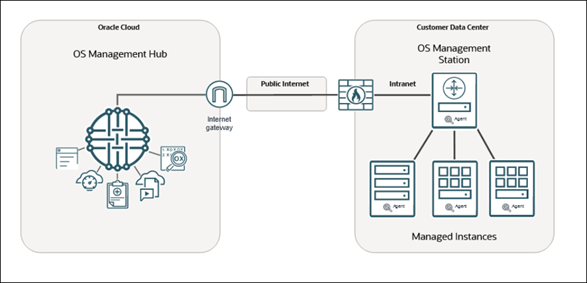
OS Management Hub provides a plugin for the Management Agent that runs on the instances in your data center. It interacts with the OS content on an instance as directed by OS Management Hub and reports data and results back to the service.
At-a-glance view of security compliance
OS Management Hub presents a summary dashboard of your managed environment. The dashboard helps monitor out of compliance patching statuses, displays the number of available and bug updates, and helps ensure instances are communicating with the service.
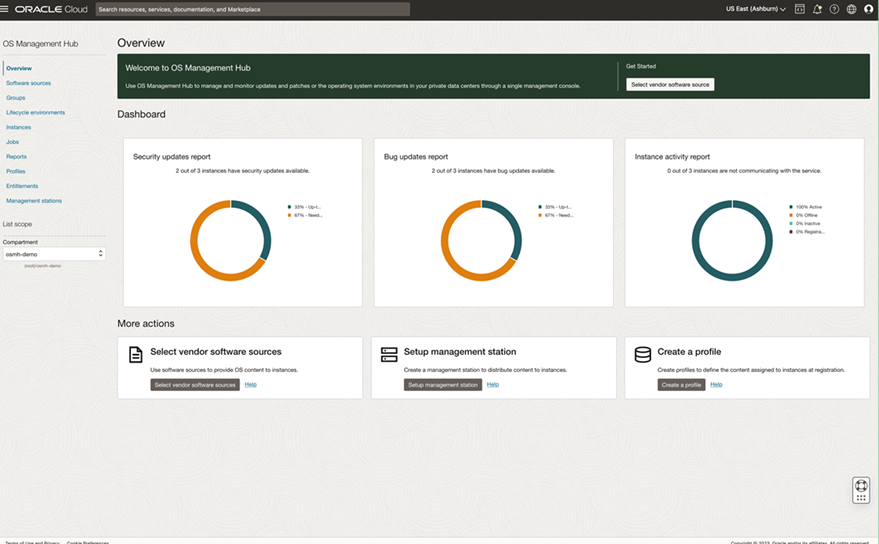
Manage and monitor instances and groups with ease
OS Management Hub lets you manage Oracle Linux instances with ease, including checking for and applying updates, installing and removing packages, and configuring modules.
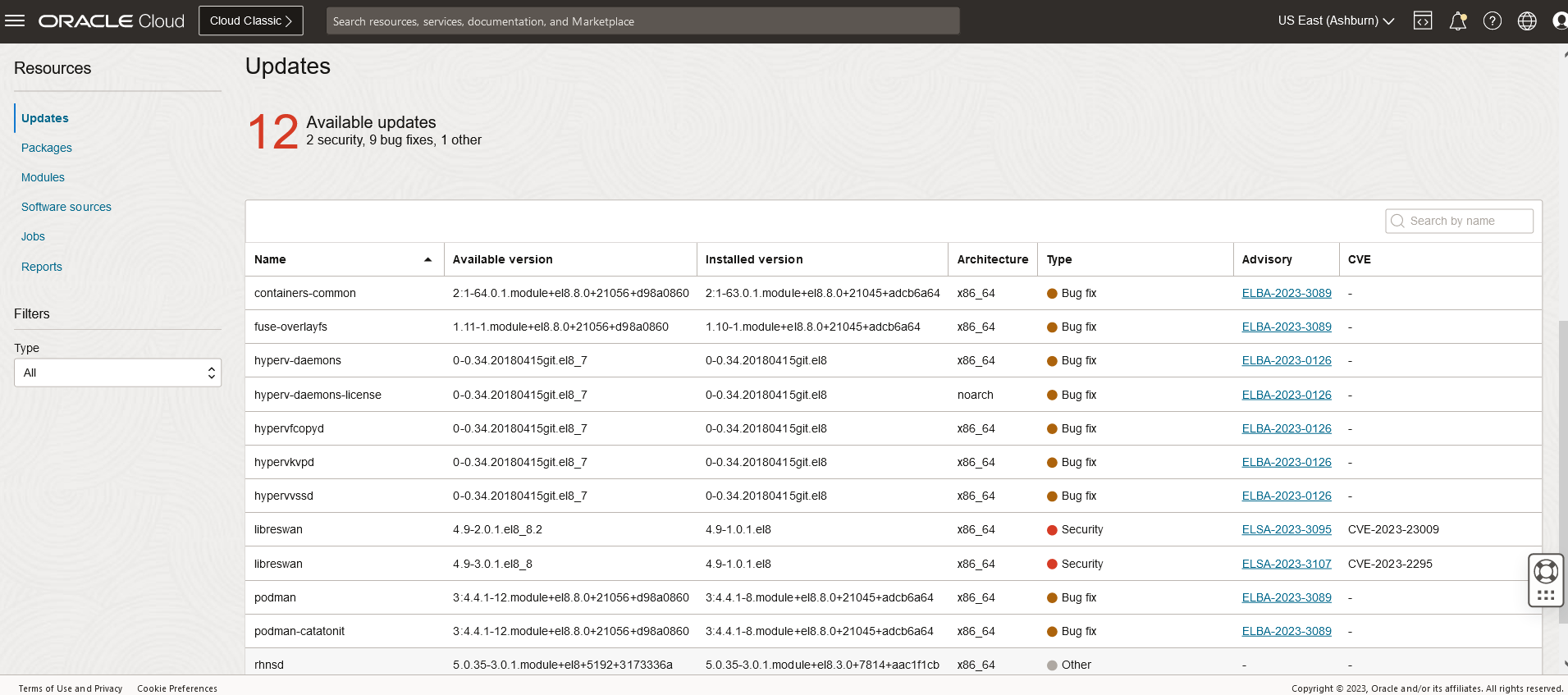
Flexible update options allow you to run all or any of the available security, Ksplice (kernel and userspace), bug, enhancement, and other updates. Update jobs can be run immediately or on a one time or recurring schedule.
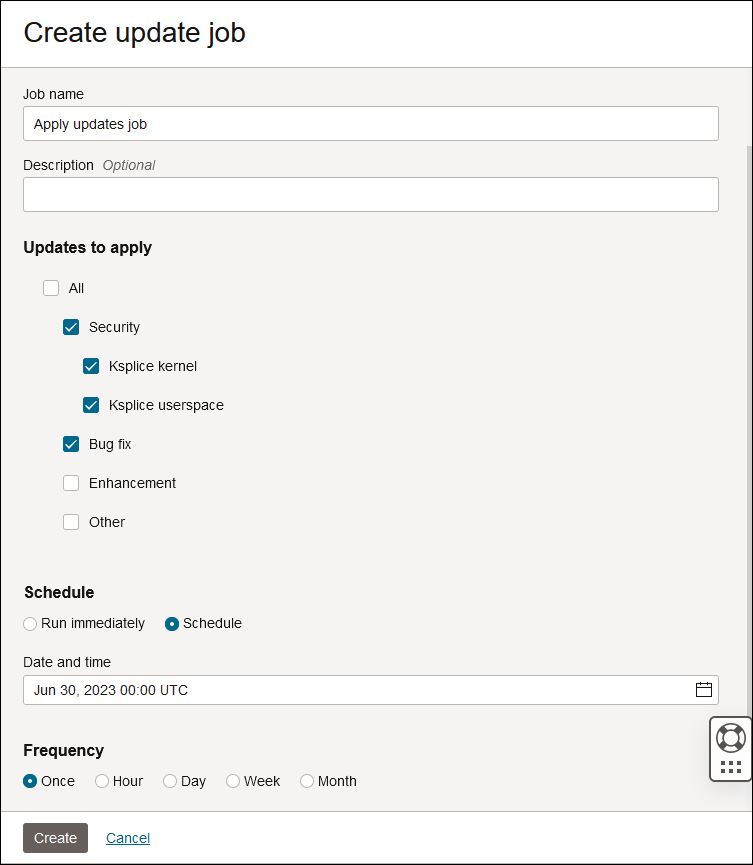
To reduce complexity and increase efficiency and scalability, you can create a group of instances that are managed together for standard tasks.
You can schedule update jobs at the group level with the same flexible options as the individual instance level.
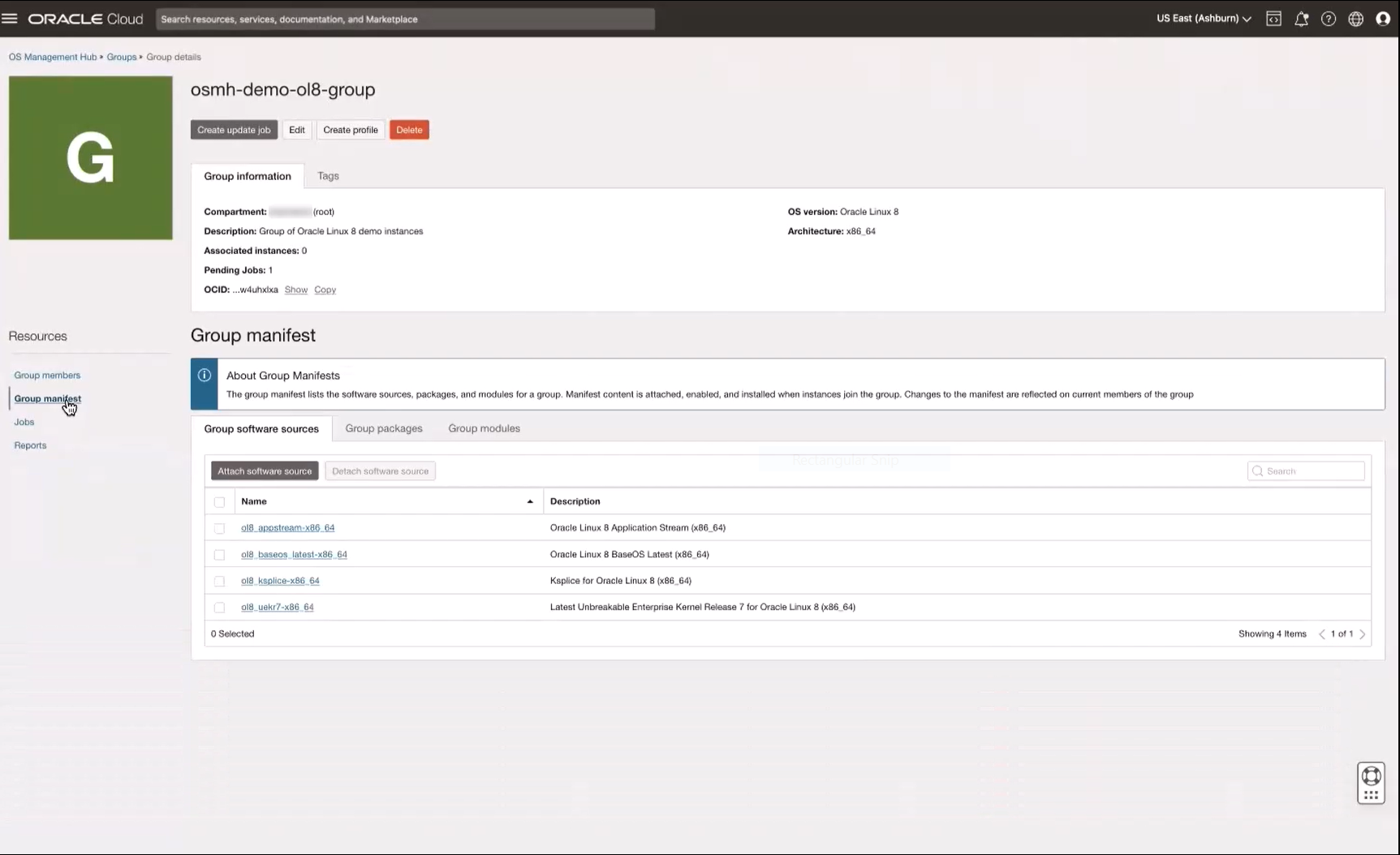
Simplified control of updates across the lifecycle
OS Management Hub simplifies the management of an otherwise complex task across groups of instances, ensuring the consistency and integrity of updates across a controlled lifecycle environment.
An OS Management Hub lifecycle environment is a user-defined pipeline to deliver curated, versioned content in a prescribed, methodical manner. Many Oracle Linux environments implement an application and system software lifecycle approach known as development, test, acceptance, and production (DTAP). To support this approach, OS Management Hub provides lifecycle environments for managing Oracle Linux deployments in customer data centers. You move content from one stage to another by promotion, for example, from development to test to production. The diagram below shows an example of how you may want to promote updates across the lifecycle stages.
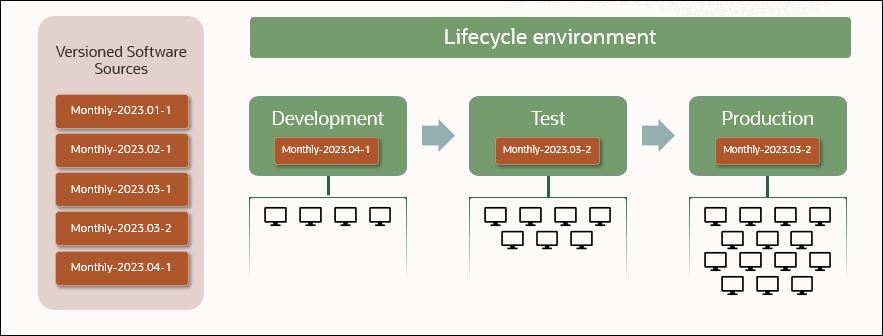
You define your lifecycle stages, assign instances to each stage, and create versioned custom software sources.
You can then promote content by associating an immutable versioned custom software source to a lifecycle stage. Only the instances assigned to that stage have access to the content in the versioned custom software source.
To promote the OS content, you can run the update job immediately or configured on a schedule.
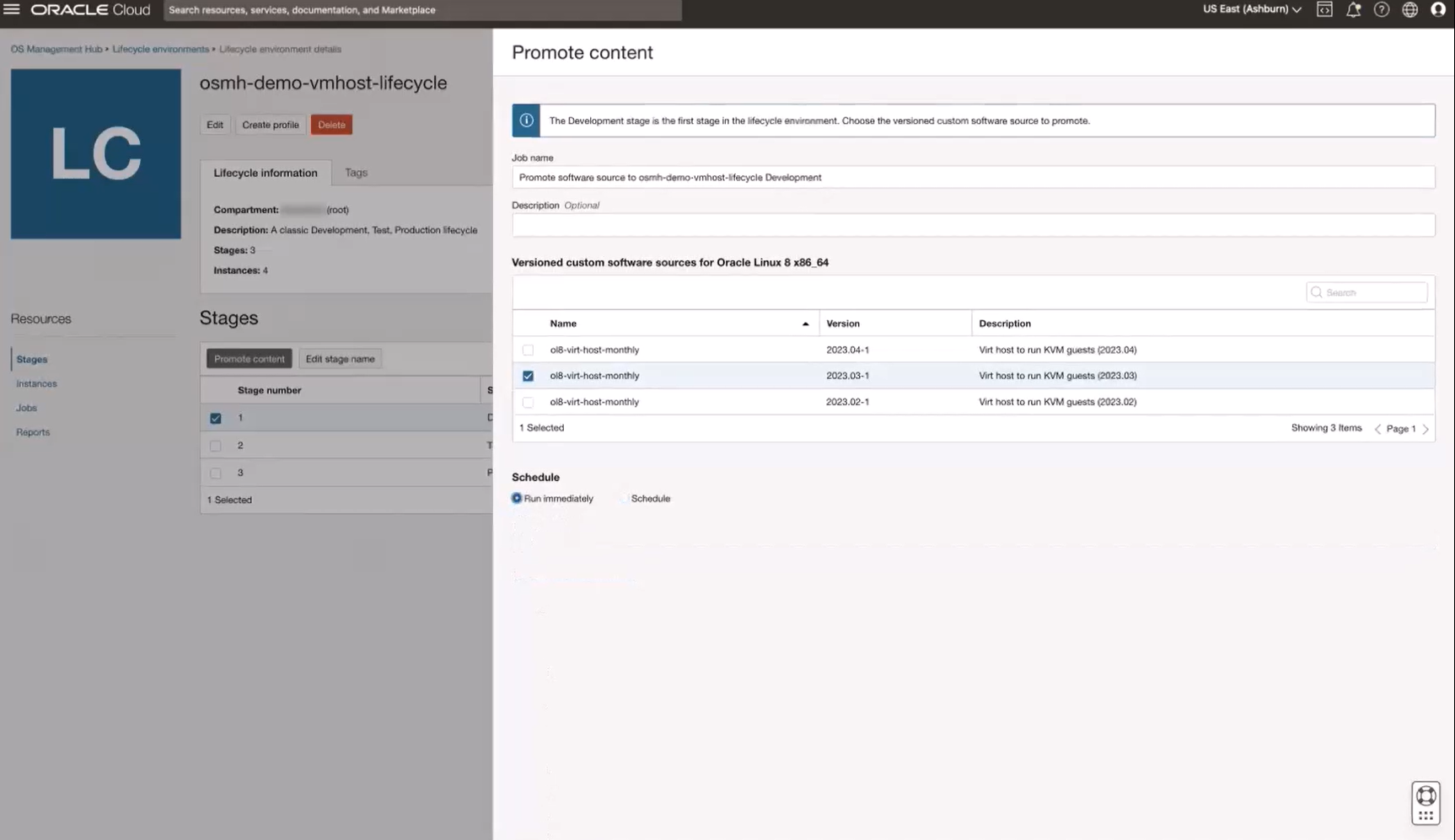
Real-time security compliance reports
A real-time report shows whether instances are up-to-date with security updates and links to security advisory information. The report can also be downloaded for use.
This report lets you know what available security updates need to be applied to stay compliant and up-to-date. You can then apply the updates from the console immediately or at a scheduled time.

Automate your OS management tasks today
To use OS Management Hub, you must be subscribed to Oracle Linux Support (Basic or Premier) to manage your on-premises environments.
When you login to your OCI account, you can access the service by navigating to the main menu, selecting Observability & Management, then clicking on OS Management Hub. For more information on how to configure and use OS Management Hub, refer to the documentation.
Get started today and see for yourself what OS Management Hub can do for you.
For more information
- OS Management Hub
- OS Management Hub documentation
- Oracle Linux Training Station
- Oracle Linux Support
- oracle.com/linux/